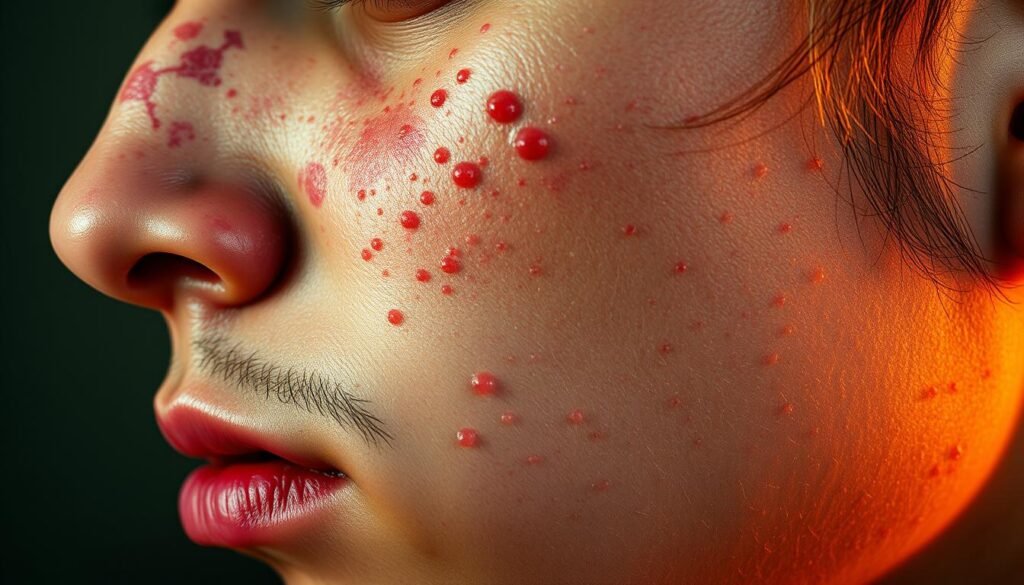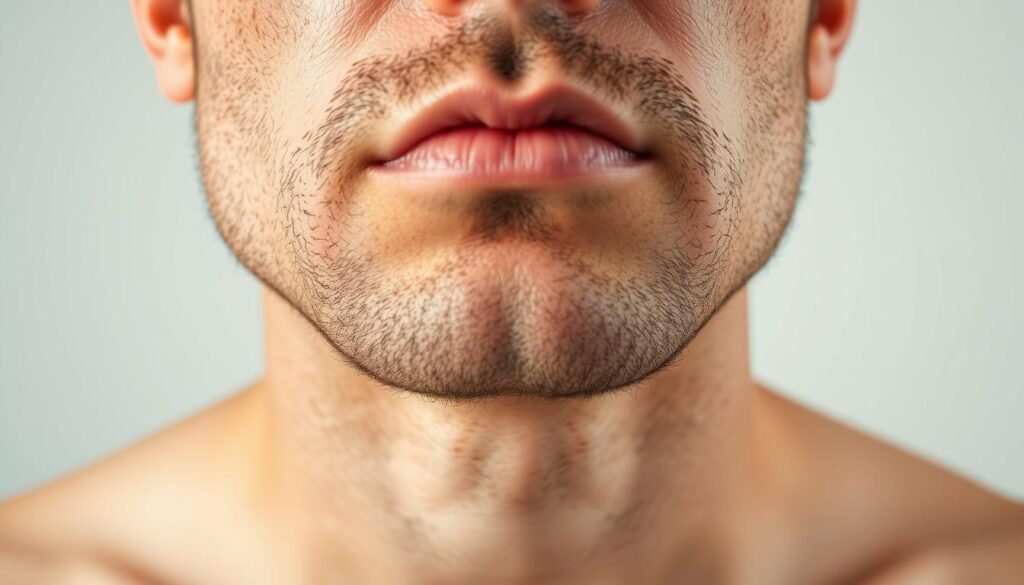About 20% of women experience hyperandrogenism, affecting their skin health. This condition leads to issues like acne, hirsutism, and thinning hair on the scalp. It’s important to understand how high testosterone levels cause these skin problems.
Testosterone plays a vital role in both men and women. When levels are too high in women, it causes symptoms that upset the skin’s balance. This article explores how hormonal imbalances lead to skin problems due to high testosterone. Knowing about this and managing it well is key for those impacted.
Key Takeaways
- High testosterone might affect 20% of women, causing different skin issues.
- Hirsutism, or male-pattern hair growth, can affect 5% to 10% of women.
- Acne is often worse in women with high androgen levels and hormonal imbalances.
- It’s crucial to understand how high testosterone impacts skin health for effective treatment.
- Taking early action can help control symptoms of high testosterone and improve skin problems.
Understanding Testosterone Levels
Testosterone is crucial for both males and females. It’s mainly produced in the testes and ovaries. Keeping an eye on testosterone levels is key for hormonal health.
When testosterone levels are off, it can cause various health issues. High or low levels can greatly affect everyday life.
High levels of testosterone might cause hyperandrogenism. This condition means there are too many androgens in the body. It can lead to acne and hirsutism, which many women struggle with.
About 5 to 10 percent of females have polycystic ovary syndrome (PCOS). It’s a top cause of hormonal imbalances. Knowing how testosterone and PCOS interact helps improve health.
Exercising regularly can help manage PCOS symptoms. A good workout plan boosts insulin sensitivity and helps with weight. For tips on exercising, visit this guide to staying active.
| Condition | Impact on Hormonal Health |
|---|---|
| Polycystic Ovary Syndrome (PCOS) | Affects 5-10% of females; often leads to irregular menstrual cycles and other hormonal issues. |
| Hyperandrogenism | Results in symptoms such as acne and hirsutism; critical to address for overall well-being. |
| Insulin Resistance | Can lead to increased risk of prediabetes and type 2 diabetes, especially in women with PCOS. |
Learning about testosterone and hormonal health is important for your health journey. Regular checks and lifestyle changes play a huge role. They lead to better physical and emotional health.
What is Hyperandrogenism?
Hyperandrogenism is when a person has too much androgens, like testosterone. It leads to many physical and emotional symptoms. Anyone can have it, but it’s common in conditions like Polycystic Ovary Syndrome (PCOS), congenital adrenal hyperplasia, or tumors that make androgens. Knowing about these high androgen levels is key to dealing with skin and reproductive issues.
In females, about one third of testosterone comes from the ovaries. The rest is made from androstenedione, by both ovaries and adrenal glands. It changes into testosterone in different parts of the body. DHEA-S, another precursor, is made in the adrenal glands. Testosterone has more effect at the androgen receptor than these precursors do.
About 5% of women of child-bearing age have hyperandrogenism. PCOS causes most of these cases, around 70%. Many women with PCOS have symptoms like hirsutism and problems getting pregnant.
The Modified Ferriman-Gallwey Score (mFG) is a way to measure hirsutism. It scores hair growth in areas sensitive to androgens, taking ethnicity into account. Too much testosterone can also cause acne. This can affect how someone feels about themselves.
Understanding hyperandrogenism helps people get the right treatment. With proper care and lifestyle changes, managing this condition is possible.
How Elevated Testosterone Levels Lead to Acne, Hirsutism, and Scalp Hair Thinning
Elevated testosterone levels affect the skin and body significantly. They link to acne, hirsutism, and thinning hair on the scalp. Understanding these connections helps us grasp the underlying causes.
Connection Between Testosterone and Acne
High testosterone levels make the skin produce more oil. This oil blocks pores, helping acne to develop. A balance of androgens is important for women to control acne.
Too much androgen leads to bad acne outbreaks. This is called hyperandrogenism.
Impact on Hirsutism and Unwanted Hair Growth
Hirsutism means extra hair growth in areas like the face and back. It often comes from high testosterone levels. Women with PCOS see this symptom a lot.
Many women with hirsutism have too many androgens in their blood. Knowing this link helps treat and manage unwanted hair growth.
Effects on Scalp Hair Thinning (Androgenic Alopecia)
Elevated testosterone can also cause hair to thin, known as androgenic alopecia. It affects both men and women by shrinking hair follicles. Thus, hair falls out over time.
This hair loss can be very upsetting. It shows how vital it is to find ways to deal with these conditions early on.

Causes of Elevated Testosterone Levels
Many things can make testosterone levels go up in people, leading to symptoms and health issues. Knowing these causes helps handle hormonal problems well.
Polycystic Ovary Syndrome (PCOS)
Polycystic Ovary Syndrome is a big reason for high androgen levels in those born female. It hits 6% to 15% of them during child-bearing years. It leads to uneven periods, more androgen, and issues like too much hair and acne. Over 90% with PCOS also have insulin problems, making symptoms worse.
Congenital Adrenal Hyperplasia
This inherited disease messes up adrenal hormone making, causing too much androgen. It shows up as bad acne and hirsutism, especially in people born female. It often starts from gene changes, mostly in the 21-hydroxylase enzyme. This results in a lot of androgens and hormonal issues.
Other Hormonal Imbalances
Lots of hormonal issues can raise testosterone levels. Conditions like Cushing’s syndrome play a big role. Also, drugs like anabolic steroids can boost androgen creation, causing many symptoms. It’s key to get these hormonal conditions under control to help with health.

| Condition | Characteristics | Symptoms |
|---|---|---|
| Polycystic Ovary Syndrome | Most common cause of hyperandrogenism, irregular menstrual cycles | Acne, hirsutism, insulin resistance |
| Congenital Adrenal Hyperplasia | Genetic disorder affecting adrenal hormone production | Severe acne, hirsutism |
| Other Hormonal Imbalances | Includes conditions like Cushing’s syndrome | Varied symptoms including hirsutism and irregular cycles |
Symptoms of Elevated Testosterone Levels
Having too much testosterone can really change your body and feelings. It’s important to know the signs like Elevated Testosterone Symptoms. These signs show up in different ways. You might get a lot of acne or more hair than usual. You could also feel your mood going up and down.
Physical Signs: Acne and Hair Growth
People with high testosterone often see clear physical signs. One big sign is Hormonal Acne. This acne can be really painful and make your skin oily. Excess Hair Growth is another sign. It means getting more hair in different places. This can make people feel bad about themselves.
Emotional Impact: Mood Swings and Aggression
High testosterone doesn’t just affect your body. It can make you feel all over the place emotionally. Many people find themselves having big Mood Swings. They can get easily upset or even aggressive. Knowing these Emotional Symptoms helps us see the big picture of high testosterone. If we spot these signs, we can find ways to feel better.

Diagnosing Elevated Testosterone Levels
Finding out if someone has high testosterone is key to treating it right. Diagnosing Hyperandrogenism means doing different medical tests. These help doctors understand what’s causing the high testosterone.
Medical Tests and Blood Work
Blood tests are vital for spotting conditions like hyperandrogenism. Doctors often check testosterone levels with morning blood samples. This is when levels peak. Other hormone levels, like DHEAS, are also checked. This gives a fuller hormone picture. Studies show these tests can find issues like PCOS or congenital adrenal hyperplasia, linked to high testosterone.
Consultation for Symptoms
Talking to doctors is key for those with signs of high testosterone. Issues like hair growth, acne, or hair thinning need checking. In consultations, doctors look at your health history and do physical exams. They use all this info to find the cause of the symptoms. Understanding these signs helps patients be more sure about their health path.
| Condition | Prevalence (% of women) | Main Causes |
|---|---|---|
| PCOS | Approx. 6 | Hormonal imbalance, insulin resistance |
| Idiopathic Hirsutism | 5-10 | Familial or unknown causes |
| Congenital Adrenal Hyperplasia | 2 | Genetic disorders affecting adrenal glands |
| Androgen-Secreting Tumors | 0.2 | Ovarian or adrenal tumors |
Treatment Options for High Testosterone Levels
Addressing high testosterone levels often involves multiple approaches. These are based on the individual’s hormonal balance. Treatments include medications and lifestyle changes to manage symptoms well.
Medications for Hormonal Imbalance
Hormonal meds are key in lowering high testosterone. Common treatments include:
- Glucocorticosteroids: These can help reduce the production of certain hormones that elevate testosterone.
- Oral contraceptives: Often prescribed to women, these can effectively decrease the hormones triggering acne and other symptoms.
- Spironolactone: This anti-androgen medication is beneficial for symptoms like acne and hirsutism in those with PCOS.
These hormonal meds help with the physical signs of high testosterone. They provide relief from acne and excessive hair growth.
Lifestyle Changes to Manage Symptoms
Lifestyle changes are crucial for managing symptoms of high testosterone. Key changes include:
- Regular Exercise: Physical activity can help balance hormonal levels and improve well-being.
- Balanced Diet: Eating whole foods and less processed ingredients helps with weight management and hormonal balance.
- Weight Management: Keeping a healthy weight is essential since insulin resistance is common in people with PCOS.
Such lifestyle changes are vital in handling symptoms. They are important in a treatment plan that focuses on medication and healthy habits. Together, they help improve skin health and hormonal balance.
| Treatment Type | Description | Effectiveness |
|---|---|---|
| Glucocorticosteroids | Reduce hormone production | Effective for some individuals |
| Oral Contraceptives | Decrease hormones triggering acne | Highly effective for PCOS |
| Spironolactone | Anti-androgen medication | Improves acne and hirsutism |
| Regular Exercise | Stabilizes hormones | Highly beneficial |
| Balanced Diet | Enhances weight management | Promotes overall health |
| Weight Management | Reduces insulin resistance | Critical for symptom management |
Living With Elevated Testosterone Levels
Managing high testosterone levels brings challenges. It affects emotional health and the need for good healthcare advice. Having Hyperandrogenism can make you feel alone or upset. A strong emotional support network is key to handle these ups and downs.
Emotional Support and Self-Care
Those with hyperandrogenism really need emotional support. Friends and family are crucial for the empathy and understanding needed. Self-care like mindfulness, exercise, and eating well helps with feeling better overall. Counseling or support groups offer a shared understanding. Professional support guides in handling emotions.
Connecting with Healthcare Professionals
Talking regularly with healthcare experts in hormones is key for handling high testosterone. They help explore treatment options that fit you. Having a team including endocrinologists, gynecologists, or dietitians ensures a complete care approach. This way, your health is looked after in all aspects.
| Support Type | Benefits |
|---|---|
| Emotional Support | Helps alleviate feelings of isolation, improves mood, builds resilience |
| Professional Support | Provides tailored healthcare guidance, explores treatment options, facilitates comprehensive management |
| Self-Care Practices | Enhances overall well-being, promotes physical health, improves mental resilience |
Impact of Elevated Testosterone on Skin Health
High testosterone levels can harm skin health, often causing acne. It’s vital to know what triggers acne. This includes diet and stress impacts. Foods high in glycemic index and dairy can make acne worse. Also, stress can cause hormonal changes that increase skin problems. It’s important to manage these factors if you have skin issues from high testosterone.
Acne Triggers: Diet and Stress
Making smart food choices and reducing stress can improve skin health. Eating whole foods, drinking plenty of water, and cutting down on sugar helps prevent acne. Adding stress-relief activities like meditation or working out can also help. These steps lower cortisol and testosterone, leading to clearer skin.
Skin Care Routines to Mitigate Effects
For those dealing with hormonal acne, setting up a good skin care routine is key. Start with gentle, non-comedogenic cleansers to avoid irritating your skin. Then, add treatments that focus on hormonal acne, like salicylic acid or retinoids. A regular skin care routine assists in controlling hormonal effects and supports healthier skin.